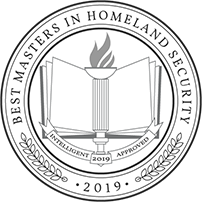Earn Your Master of Professional Studies in Homeland Security Studies
 On Campus
On Campus Online
Online Campus/Online Combo
Campus/Online Combo


Spark your passion for helping others while also amplifying your career possibilities with an advanced degree from the Tulane School of Professional Advancement. The Master of Professional Studies (MPS) in Homeland Security Studies focuses on securing and maintaining the safety of U.S. residents through practical applications of security and emergency management.
From courses on domestic and international terrorism and intelligence research methods to examinations of emergency management and border security, the curriculum dives deep into the policies and strategies used in today’s advanced homeland security sector. Upon completion of core courses, you will also have the opportunity to develop an individual plan of study with the Program Director based on your specific interests, including courses outside the Emergency and Security Studies program available on-campus.
Boost your resume with a graduate certificate in Intelligence. You can complete this certificate by taking only four courses. Then, those credits can be applied toward an MPS in Homeland Security.
An Entirely Online Degree With In-residence Flexibility
We believe that going back to school shouldn’t have to mean putting your life on hold. That’s why Tulane SoPA students may choose to complete their master’s entirely online or through a combination of online and on-campus courses. Course availability may vary depending on your campus location, and select elective courses not within the Emergency and Security Studies program are only offered on campus and not in online formats. See how homeland security and emergency management impact people’s day-to-day lives by visiting our program’s YouTube playlist.
Take the Lead in Intelligence, Security, or Emergency Management
The MPS in Homeland Security Studies will prepare students to work in the fields of emergency management, intelligence analysis, counterterrorism analysis, cyber security, border protection and security, and infrastructure protection at all levels of government and in the private sector. Those with experience in the military or as a first responder can apply their knowledge and enhance their technical and interpersonal skills through this program. As a Silver Award Military Friendly® recipient, our office of Veterans Affairs is committed to your success and can connect you to educational benefits, learning resources, and financial aid.




Graduates can pursue the following professional roles:
- Intelligence Community Officer
- Counterterrorism Analyst
- Federal, State, or Local Law Enforcement Officer
- Federal, State, or Local Homeland Security Officer
- Border and Immigration Officer
- Infrastructure Protection Analyst
- Transportation Security Analyst
- Maritime Security Analyst
Develop Job-ready Technical Skills From Industry Leaders
Through the MPS program, you will gain applicable, real-world skills from professors who have experience in areas such as the FBI, law enforcement intelligence, emergency response, and more. Take your next step in a growing industry with professional development and networking opportunities built into your curriculum and a diverse group of student peers who share your passion for public safety and security.

MPS Admission Requirements
Students applying to the MPS in Homeland Security Studies program must hold a baccalaureate degree from a regionally accredited college or university. Applications to the program must include the following:
- A statement of 250-500 words discussing their background beyond academic coursework, and how the program will assist them to achieve professional objectives.
- Official college transcripts from each college attended. Typically, successful applicants will have at least a “B” (3.00) average in all coursework taken.
Applicants may be conditionally admitted and allowed to take one class in their first semester, in which a B or better must be earned to be fully admitted to the program. Students who do not meet the 3.00-grade point average in their undergraduate coursework but who possess sufficient professional experience in the security studies field may be admitted provisionally into the program.
Completed applications are reviewed by the MPS in Homeland Security Studies Director, Dr. Michael Wallace and Admissions Committee throughout the year.
To begin the admissions process, complete the online application.
MPS Degree Requirements
The School of Professional Advancement awards the MPS in Homeland Security Studies degree following the successful completion of 11 graduate courses comprised of six core 600-level courses and one core 700-level course, which may include graduate courses from other Tulane schools. No thesis is required. Graduate students seeking to enroll in more than 9 credit hours per semester require approval from the Program Director. Students may not apply more than two independent study courses toward fulfilling graduation requirements for the MPS. In order to earn the MPS, a student must have a cumulative grade point average of at least 3.00. Students must also apply for a degree at the beginning of the semester in which the student plans to complete all required coursework. Applications for degree conferral are now online and will appear in a student's Gibson account when available.
Concentration Details
In addition to the required core courses for the MPS in Homeland Security Studies, students may select elective courses from a wide range of choices. Additionally, elective courses may result in a graduate degree concentration. The Online Master’s in Homeland Security Studies offers two optional concentrations: Cybersecurity and Intelligence.
Cybersecurity
A concentration in Cybersecurity presents students with an in-depth exploration of enterprise security of networks and communications as well as cyber incident response and investigation. Coursework also includes a comprehensive look at current threats to IT infrastructures as well as the premeditation that goes into attacks and what motivates attackers. As organizations are growing increasingly dependent on cybersecurity professionals and evolving technologies to defend against malicious online threats and security breaches, the demand for these positions continues to grow. According to the Bureau of Labor Statistics, occupations within the cybersecurity field will increase by 26 % by the year 2022.
|
Cybersecurity Concentration |
||
|---|---|---|
| Course | Title | |
| CPST 6320 | Business Intelligence | |
| CPST 7800 | Cyber Law and Policy | |
| HMLS 7800 | Cyber Threats and Homeland Security | |
Intelligence
The field of intelligence studies is devoted to developing analytical, communication, written, computer, critical thinking, and interpersonal skills. The intelligence concentration focuses on the missions, methods, and organizational arrangements of intelligence in general, and US intelligence in particular. It focuses on the three significant elements of intelligence –collection, analysis, and counterintelligence –and their applications in the real world. Additionally, courses explore the relationship between intelligence and national security, the use of intelligence in policy making and implementation, and privacy rights.
|
Intelligence Concentration |
||
|---|---|---|
| Course | Title | |
| HMLS 7500 | Intelligence Research, Methods and Analysis | 3 |
| HMLS 7525 | Human Intelligence and Counter-Intelligence | 3 |
| HMLS 7550 | nformation Operations and Open Source Intelligence | 3 |
Eligibility for Transfer Credits
Students in good standing may petition to transfer a maximum of nine credit hours (three courses) of graduate coursework from other colleges or universities to the MPS degree. However, only courses with grades of B or better, completed within five years of enrolling in the MPS program, may be considered for transfer credit.
Listing of Required Courses
Click here for listing of MPS in Homeland Security Studies required courses and course descriptions.
The MPS consists of four core graduate courses that cover a range of academic disciplines such as medical issues for non-medical emergency managers, intelligence analysis, maritime security, and advanced approaches to counterterrorism.
Course Descriptions
HMLS 6150 Introduction to Emergency Management
This course will be an advanced examination of modern emergency management concepts, trends nationally and internationally, practical and political issues and policies, technological applications to emergency management, and the development and practical implementation of sound emergency management practices designed to protect people, communities, critical infrastructure and key assets. Included will be a brief review of emergency management policy and procedures in the United States and other countries, legal issues, social science perspectives, planning concepts and techniques, disaster modeling, operational problems, analytical methods, special populations, and management styles. Additionally, case studies will be examined to determine the extent of effective or ineffective planning, responding, and recovering from natural and technological disasters.
HMLS 6250 Health and Medical Issues in Emergency Management
An advanced study of the important health and medical management issues involved in crises and emergencies presented for the non-medical emergency manager. The wide range of medical and health issues inherent to a crisis including biological, radiological, nuclear events and emergencies are described. Students will focus on innovative response and recovery including long term public health recovery issues methods for integrating medical, public health, and psychological processes into emergency management.
HMLS 6500 Intelligence Analysis and Critical Thinking
This course is designed to give students an advanced understanding of intelligence-gathering and analysis as it relates to critical thinking; linkages to money laundering, risk management, risk assessment factors, operational concepts and strategic implications. It is a logical follow-on study that further examines the collaborative process of intelligence analysis and will provide homeland security professionals tools, framework and concepts to further develop their leadership skills by understanding how the synthesis and utilization of intelligence impacts decision making in tactical, operational and strategic settings while emphasizing the principles of holistic, all-hazards approach to preparedness.
HMLS 6600 Homeland Security and Approaches to Counter-Terrorism
Students will employ critical analysis to examine key policy issues and balances that must be addressed in strategic counterterrorism planning, particularly in the use of applied technology within the context of civil jurisdiction and rule of law. The course will examine terrorist threats to the homeland and how these threats can be met by the application of science and technology. Policy issues that address the balance between security and civil liberties that must be resolved to effectively counter terrorism will be discussed. These issues will be addressed from the governance perspective of a liberal democracy. Strategic planning principles that integrate capabilities of current and future applied technology and the key legal and policy issues that must be resolved in order to make effective use of information as balanced against civil liberties will be explored as well.
HMLS 7200 Domestic and International Terrorism
The course will provide insight and analysis into the ideology, structure, financing, and driving forces behind terrorist individuals and groups inside the United States (“homegrown”) and international (foreign) groups. The course will offer a critical analysis of the governmental response to the “war on terrorism”, including contemporary models of counterterrorism. Students will also explore the published works of leading thinkers regarding the concept of terrorism and will discuss and analyze the goals, motivational factors, targets, and tactics of terrorist organizations regardless of ideology. Additionally, students will learn techniques for evaluating vulnerability to all forms of attack, as well as the threat terrorism poses to modern society, while staying abreast of the current roles, and responsibilities of all levels of government agencies in countering terrorism.
HMLS 7300 Maritime and Border Security
This course will examine key policy issues and balances that must be addressed in all aspects of Maritime Homeland Security. The current paradigm of security on the world’s waterways and in the ports of the United States is one of overlapping layers of security. Each layer is specific to a particular port, commodity, state government, governmental agency, maritime classification society, and other maritime agencies, shipping routes, intermodal transportation nodes and shipping methods and end user requirements. It is this intricate and overlapping series of security measures that provides protection and security within the maritime transportation infrastructure against a wide variety of threats.
HMLS 7500 Intelligence Analysis/Critical Thinking
This course presents students with an analysis of how intelligence is collected and processed and how the resulting estimates contribute to the formation of national policy and homeland security. This course examines the collaborative process of intelligence analysis and is designed to provide students the tools, framework and concepts required to develop leadership skills through understanding how the synthesis and utilization of intelligence impacts decision making in tactical, operational and strategic settings within the framework of the principles of all hazards preparedness. Students will gain an understanding of the history and fundamental concepts of intelligence-gathering and analysis. In addition to tracing the development of intelligence organizations, it examines both the disciplines of intelligence (signals intelligence and espionage, for example) and its products. Case studies will be employed to illustrate enduring issues or problems in the study of intelligence.
HMLS 7600 Critical Infrastructure Protection
This course closely examines the Critical Infrastructure Protection process to secure the effective protection of people, physical entities, and critical information and support systems in the event of natural disasters, and accidental or intentional man-made incidents of major destruction. The course will provide an analysis of a time-efficient and resource-restrained practice that ensures the protection of those critical infrastructures upon which survivability, continuity of operations, and mission success depend. The course will guide students in the theories of physical protection and conducting vulnerability assessments of critical infrastructure elements. We will examine the critical sectors identified by the United States Department of Homeland Security and how disruption of these sectors could effect the civil population and the national economy.
HMLS 7700 Transportation and Border Security
This course closely examines the complexities of protecting the borders of the United States and ensuring the safety and security of the U.S. transportation system, including intermodal connections. Fundamentally, the course considers the relationship between security and the need to maintain supply chain flow and how certain strategic approaches can buy down risk. The course also analyzes the changes in security arrangements from pre- to post-9/11 policies, relative to border and transportation security, with a synthesis of the organization of the U.S. Department of Homeland Security and national policy processes. In so doing, the course assesses the adequacies of extant national strategies and implementing plans that address the spectrum of policies involving protection, detection, deterrence, defense, recovery and reconstitution of border and transportation systems. Issues concerning border and transportation security are inextricably linked with global security policies affecting the international supply chain and the cross-border transportation of goods and passengers. Therefore, class discussions and readings will examine the international framework and context of border and transportation security policies.
HMLS 7750 Homeland Security: the National Challenge
The goal of this course is to explore the published works of leading thinkers regarding the evolving nature of Homeland Security and assist students with the tools and resources necessary to gain an understanding of the principles prescribed. Students will learn techniques oriented toward understanding the threats posed to modern society, while staying abreast of the current and future roles and responsibilities of all levels of government agencies in countering threats from the prospective of all hazards preparedness. The political, economic, and practical issues of implementation are thoroughly examined. The course will examine responses to the terrorist threat as well as natural and manmade disasters to include public policy legislation and documents, such as national security strategies, homeland security decision directives, the National Response Framework and National Incident Management System. An overview of the history of The Department of Homeland Security model of planning, protecting, responding, and recovering from a natural disaster and terrorist attack is analyzed. This course provides an overview of Terrorism, Homeland Security, and risk assessment methodologies. Students will learn how to identify vulnerabilities, analyze and mitigate risk, and harden critical infrastructure sites through countermeasure proposals. This course also includes an examination of the basic legislation and operations of the U.S. Department of Homeland Security and its role in protecting the United States by detecting, deterring, preventing, and responding to potential threats, current and future.
HMLS 7800 Cyber Threats and Homeland Security
“Cyberspace” has become a pervasive presence in modern society, and a healthy functioning cyberspace is elemental to our economy and to national security. Along with benefits, however, there exists threats and malicious actors who seek to exploit cyberspace vulnerabilities, and, in doing so, threaten critical infrastructure and threaten National Security. This course will study the nature of cyber threats, including computer and digital crimes, information warfare and cyber terrorism, and related threats to personal, organizational, economic and national security. Students will gain an understanding of the variety and nature of cyber threats including digital espionage, computer break-ins, computer hacking, malware, communications eavesdropping, forgery, disruption to information flow, electronic bombs, cyber war and the growing presence of terrorist organizations on the internet. This course will also review countermeasures and a protection methodology to cyber threats, cyber security investigations, evidence gathering, and legal challenges. Lastly, this course will review current and national policies for securing cyberspace and the impact of cyber security on privacy and civil liberties.
Course Progression
The MPS courses are designed to be taken in any order, with the exception of the intro course and capstone. Below is an example of how a typical part-time MPS student may progress through the courses.
Tuition & Fees
Information about SoPA tuition and fees may be found here.
Some courses have fees to support the technology needed for high-quality virtual and on-ground experiences. These fees are always listed on the schedule of classes.

To download an e-brochure on our MPS Homeland Security Studies, please enter your details below.
By submitting this form, you agree to receive information about the Tulane School of Professional Advancement’s programs via email, phone and/or text. You may opt out at any time.
